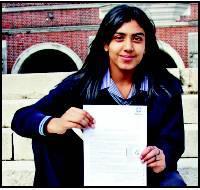
Margao, October 14: With a Mensa IQ score of 162, a 15-year-old London teenager with Goan roots has beaten Albert Einstein and Stephen Hawking. Fabiola Mann's IQ has put her in the top 1% of intelligent people in the world, two points over the 160 scored by the scientific greats.
Mensa, founded in 1946 as a society for intelligent people, awarded Fabiola her membership certificate in August this year. The Harrow-on-the-Hill-resident, who wants to study medicine at Cambridge University and become a surgeon "because I like the idea of helping people", told STOI from London that she wasn't expecting the score.
"I had heard about Mensa and so decided to take their test," Fabiola said in an email. Being "always interested in puzzles", she "begged" her parents to apply for the test and paid the fee.
On July 30, the Northwood College School pupil sat down for a formal, supervised, three-hour test at the London UCL medical college. "The questions were slightly more confusing (from the practice IQ tests online) and we did not have much time to do them, so I could not really tell how I was doing," said Fabiola.
She had wait for a month for her scores instead of the customary two weeks as the results were lost in transit. "We went on holiday soon after (the test), and it was a month before I finally got a letter through the post telling me that I had an IQ of 162 and was invited to join Mensa. I was thrilled," said Fabiola.
Her mother Rene, a Margao native who moved to London in 1993 after marriage, said, "Obviously I had heard about Mensa and genius IQ level children, but I'm amazed that my own daughter is one."
Dad Anthony, who was born in England and is a lecturer, informed Fabiola's school, which in turn contacted local UK newspapers. Fabiola was interviewed by BBC in September and is also mentioned on the Mensa website. In her interview with 'Harrow Observer', the paper observed that "162 is the highest possible score anyone can achieve in the UK and European test".
Asked what the Mensa membership means to Fabiola, Rene, a news producer for Associated Press Television Network, told STOI from London, "People keep asking me the same thing, and to be honest I don't know. Hopefully it will mean an entry into the best universities and later job opportunities."
She quickly adds, "Of course Fabiola did not do (the test) for those reasons, these are just a mother's dreams. More than that, I hope she can go forward and realize her potential and do good in this world."
Fabiola's hobbies include martial arts — she has a purple belt in karate, and started taekwondo this year —chess and music. She plays the piano and guitar and according to her peers has an "amazing voice". She also loves creative writing and is currently working on a novel.
Fabiola's Margao-based grandparents Palikaran George, 79, and Teresa, 67, are "speechless" on their granddaughter's feat and can't wait for her to visit in December.





Comments
Add new comment